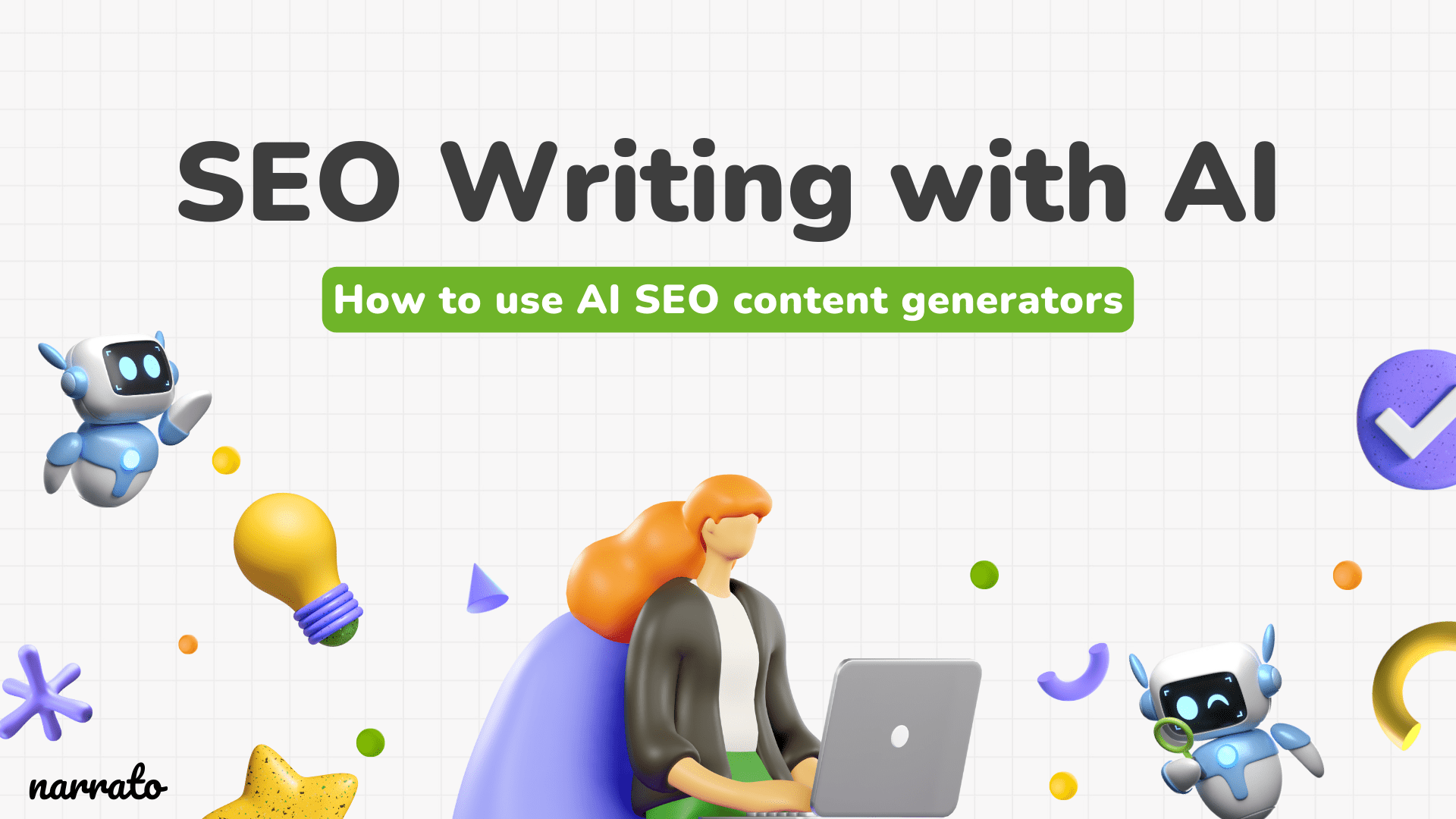How to stand out in the ever-expanding sea of online content? That’s a common challenge faced by most marketers and brands today. SEO writing is not just about putting together a few words on a webpage anymore; it’s an art form, a strategy that requires a careful balance between relevancy and discoverability. SEO writing with AI can be the key to achieving this balance. AI can help fine-tune your SEO strategy, pushing the boundaries of productivity and creativity. According to a recent Semrush survey, 65% of business are achieving better SEO results with AI. That is huge!
But how exactly do you harness the power of AI without losing your unique voice in the echo chamber of searchable, SEO-friendly content? That’s what we’re going to cover in this article. We’ll provide you with a step-by-step guide for using AI SEO content generators to make your content a favorite of both your audience and search engines.
What is the purpose of SEO writing with AI?
A guide to SEO writing with AI
- Step 1. Generate SEO-friendly content topics with an AI topic generator
- Step 2. Create an SEO content brief using AI
- Step 3. Create a long blog article from the SEO brief
- Step 4. Enhance your content using AI
- Step 5. Generate SEO meta title and description
- Step 6. Run final grammar, plagiarism, and SEO checks
Best practices for SEO writing with AI

What is the purpose of SEO writing with AI?
SEO writing with AI combines the power of artificial intelligence and search engine optimization techniques to create optimized content that drives organic traffic to your website. AI SEO content generators use advanced algorithms to analyze keyword trends, audience behavior, and search engine requirements. By incorporating relevant keywords and phrases, these tools ensure that your content ranks higher in search engine results pages.
Narrato’s AI Content Assistant offers 100+ AI and SEO tools to generate content for a variety of marketing projects. The AI article writer is especially useful for generating SEO-optimized blogs 10x faster. There’s also an AI keyword generator, SEO brief generator, and various other AI SEO tools to help with SEO content planning, writing, and optimization. You’ll get to learn more about them in the upcoming sections, when we’ll walk you through the step-by-step process of SEO writing with AI.
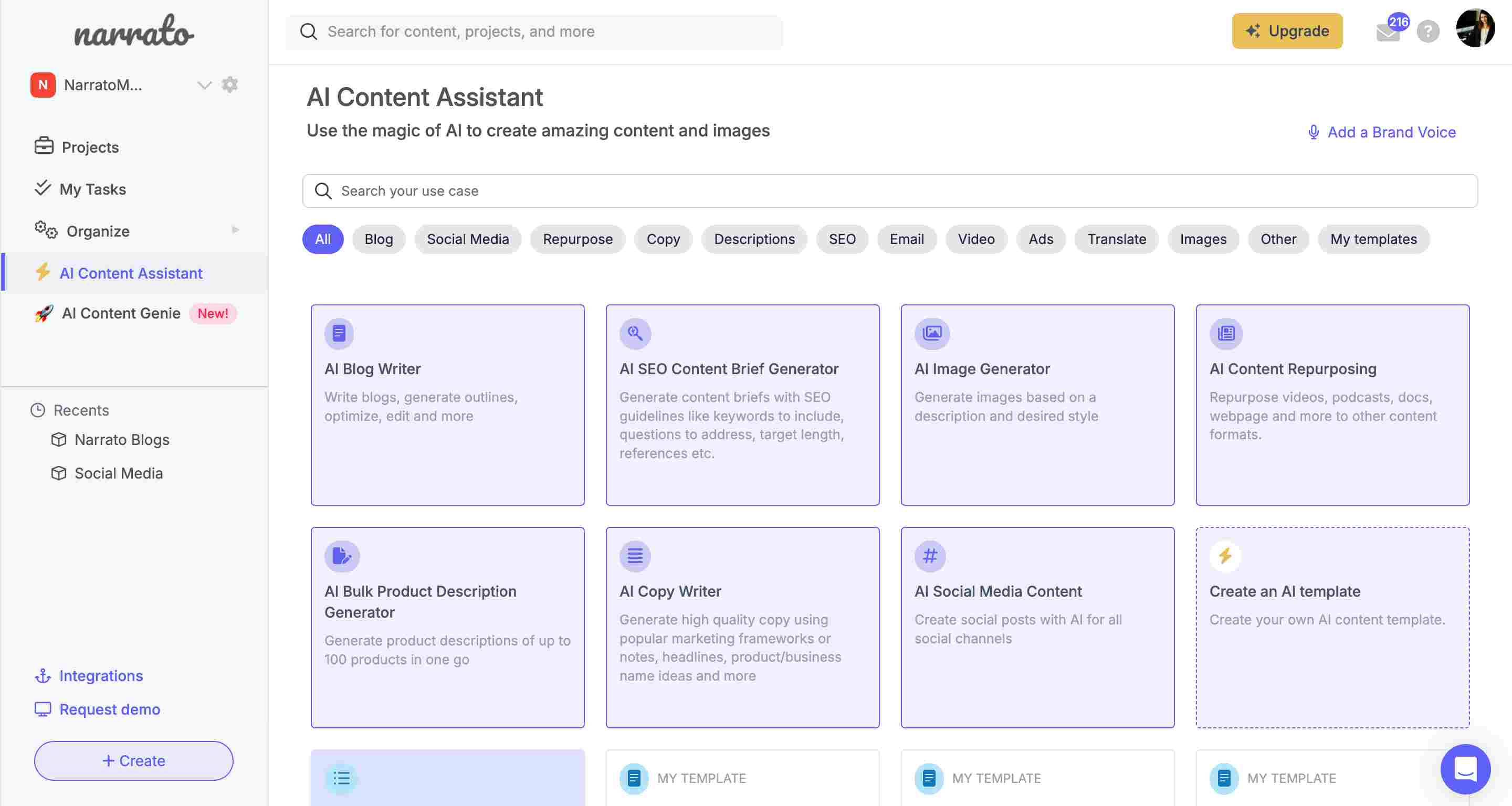
Narrato AI Content Assistant
But how does SEO writing with AI improve your process? Well, it’s all about boosting efficiency and effectiveness in your content-led SEO strategy. The beauty of AI SEO writing is that it saves you time and effort while still delivering top-notch content. It’s like having your own personal writing assistant that understands SEO best practices to generate well-written, informative, and engaging articles that appeal to both readers and search engines. Using AI in SEO writing can streamline the content creation process, simplify SEO audits to optimize existing content for search engines with less effort, and maintain a competitive edge in your niche. You can even create SEO blogs in under 15 minutes using AI.
A guide to SEO writing with AI
SEO writing with AI is an essential skill in today’s digital landscape. It takes away the guesswork, streamlines the content writing process, and maximizes your content’s potential. Let’s break this down and see how it works.
Step 1. Generate SEO-friendly content topics with an AI topic generator
When it comes to SEO content writing, a great starting point is using an AI topic generator to generate content topics. These AI tools can save you time on brainstorming by providing you with a list of SEO-friendly content ideas to work with. It just needs a keyword or a general theme you want to create content around.
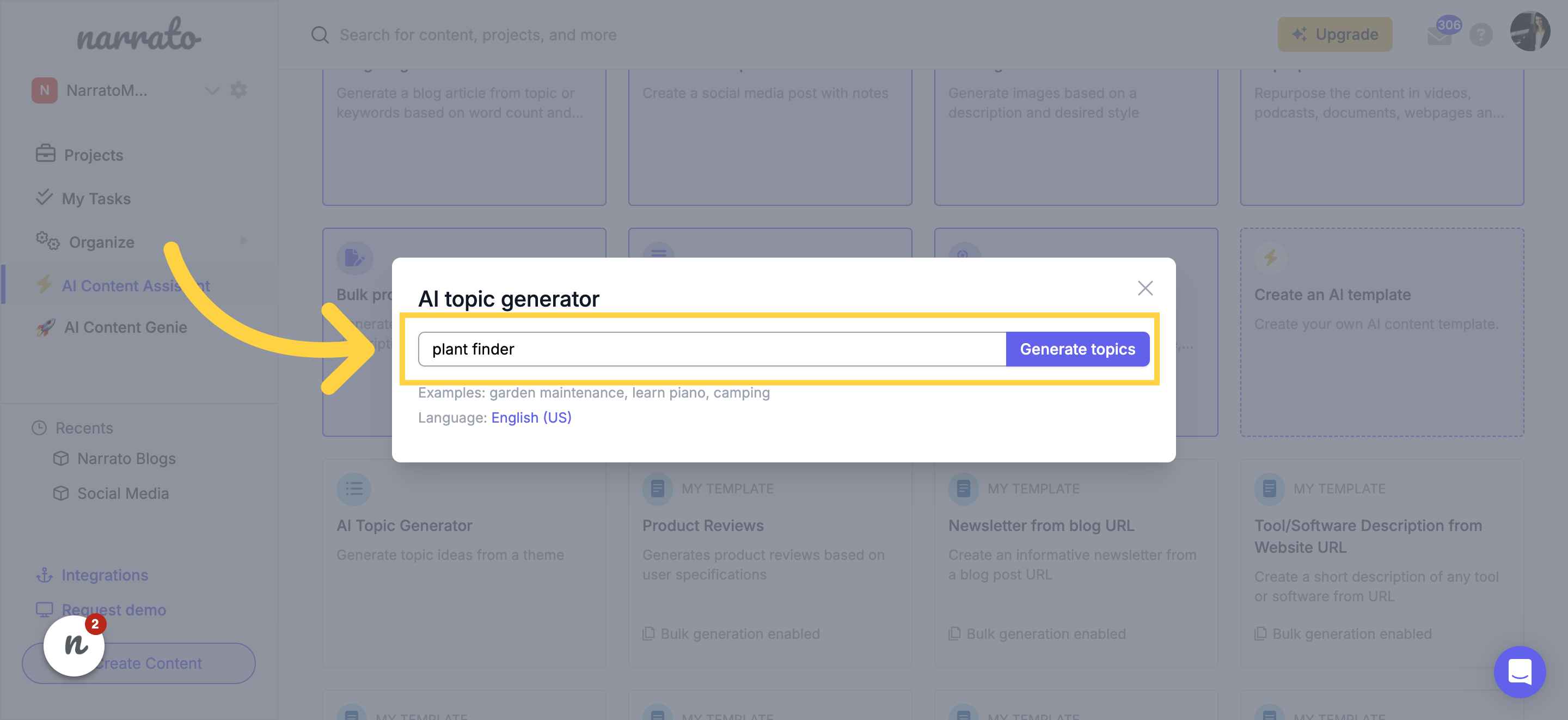
Entering the keyword(s)/theme for topic suggestions
The AI will suggest various content topics with high SEO value.
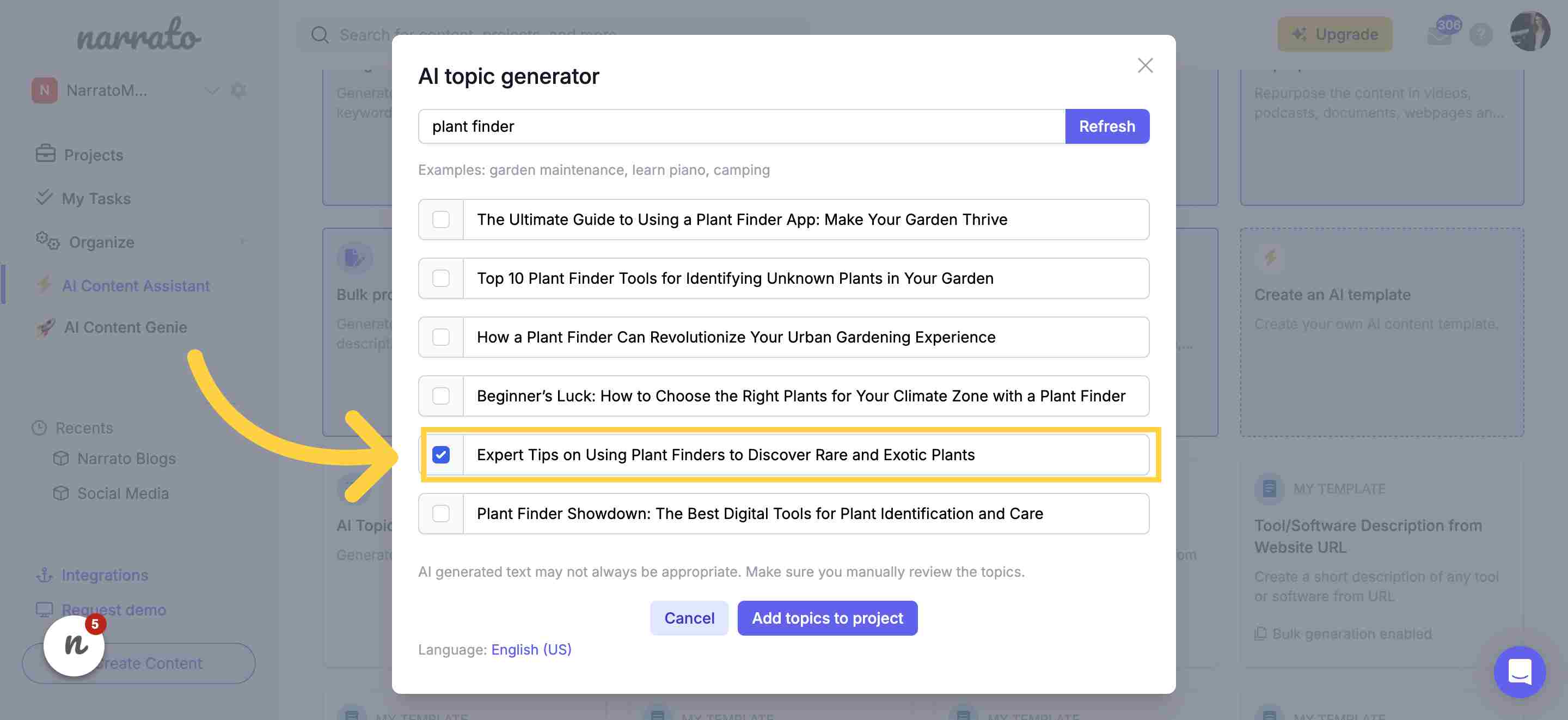
AI-generated topic suggestions
You can select the topics you like, and add them to a project on Narrato workspace as new content tasks.
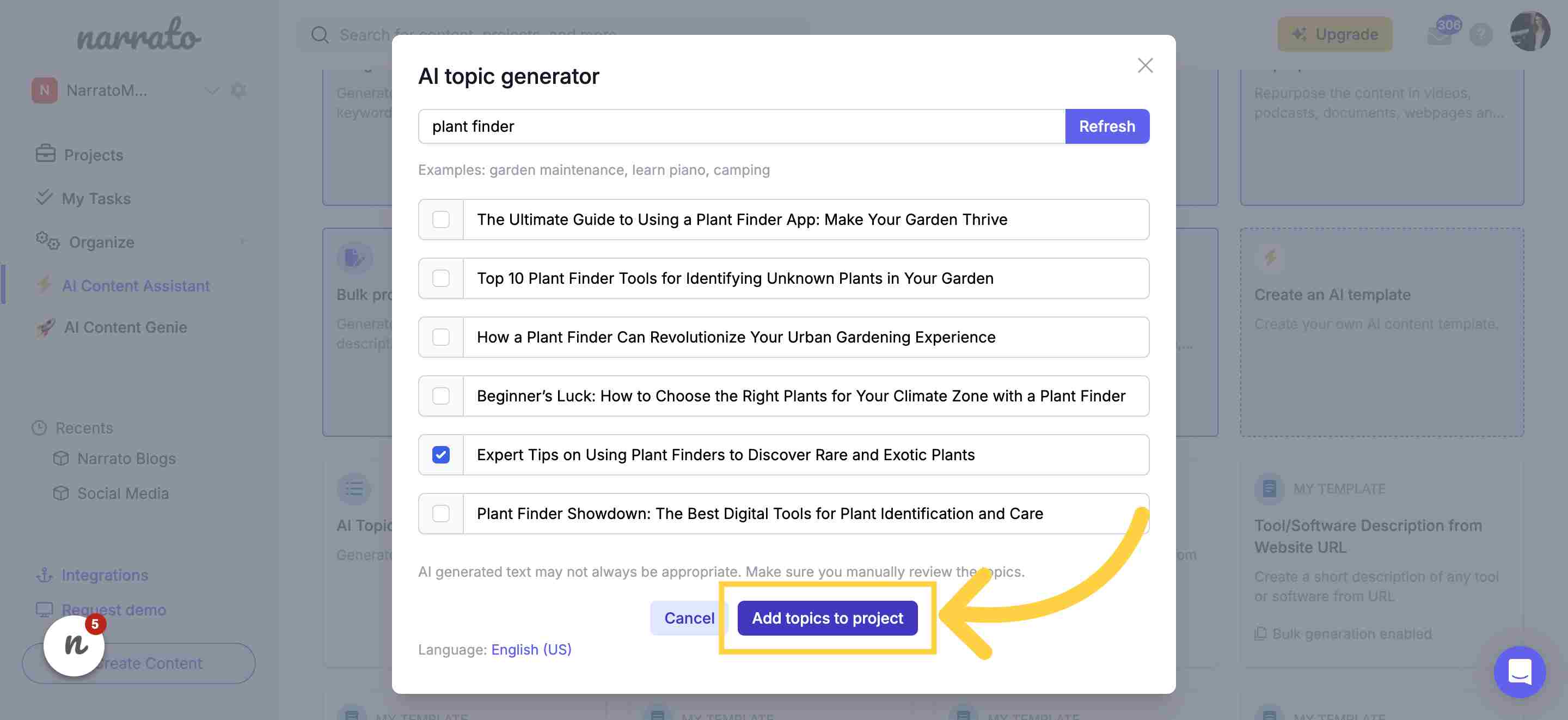
Creating a content task using the AI-generated topic
Using AI to generate content ideas is that easy.
Step 2. Create an SEO content brief using AI
Once you have your topic, the next step is to create an SEO content brief, that includes suggestions for keywords, questions to answer, headings to consider, and even content structuring suggestions. This ensures that from the very start, your article is built with SEO in mind. AI SEO tools can be a big help here as well.
Creating an SEO brief using Narrato’s AI SEO content brief generator is pretty simple. Click on “Generate SEO brief” on the content task page.
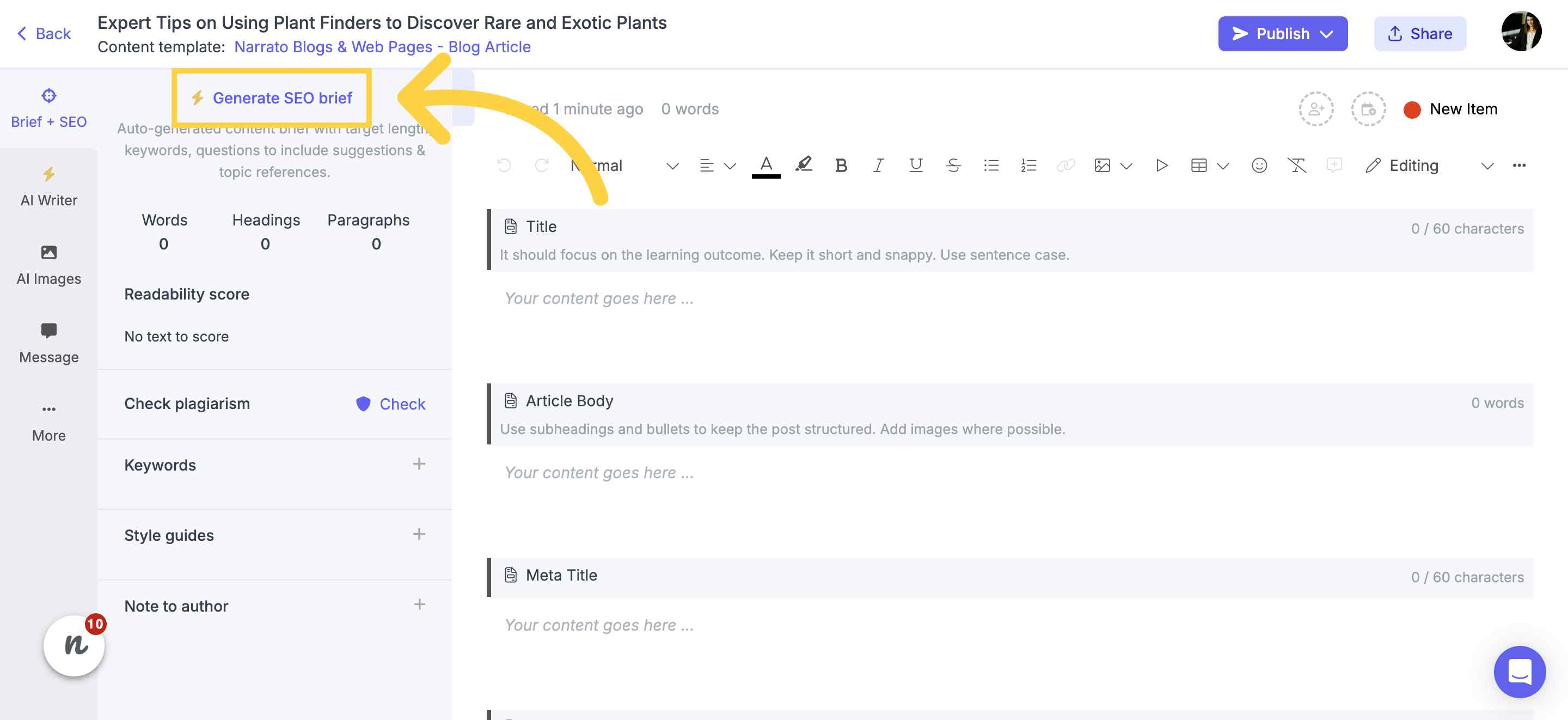
Opening the SEO brief generator
Provide the tool with your primary keyword or the topic.
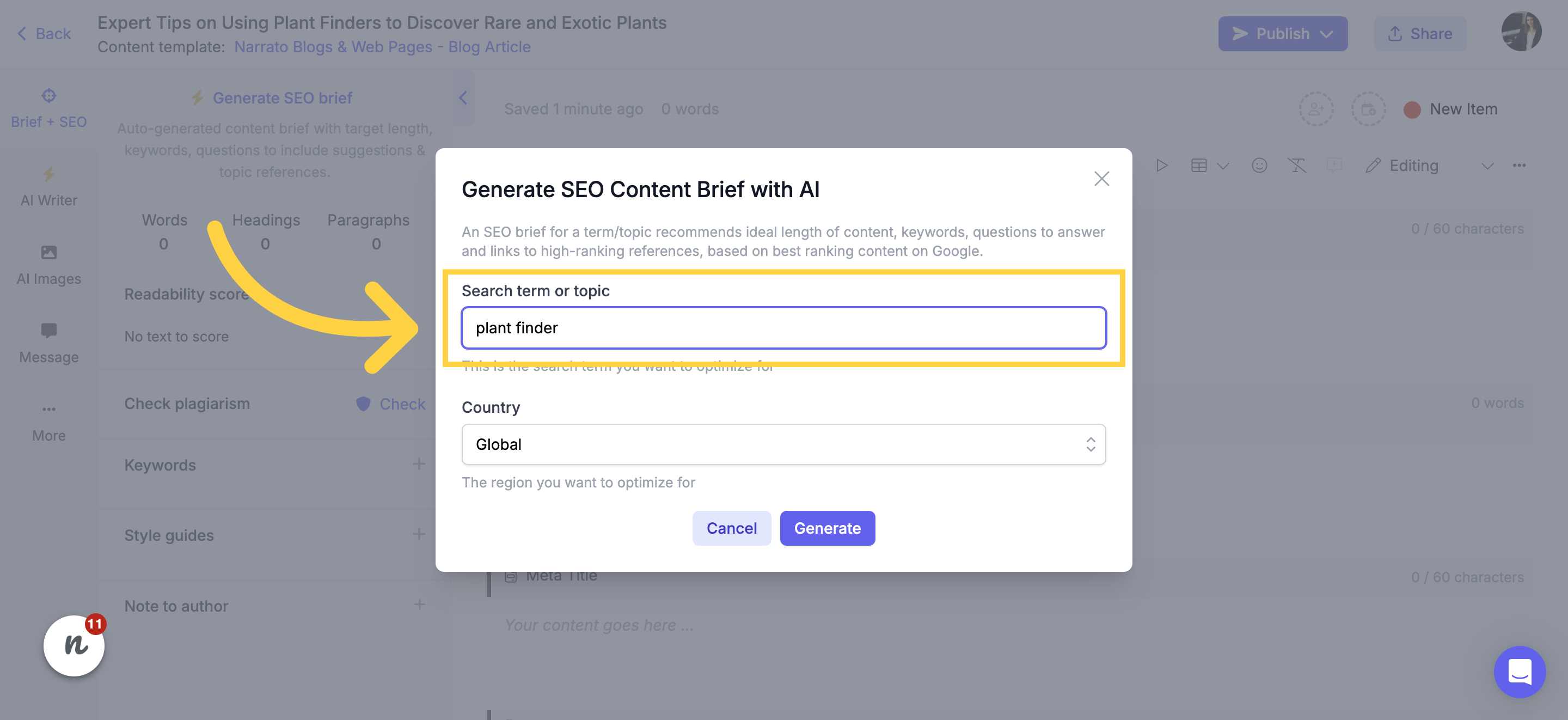
Generating the SEO brief with keyword
The AI will analyze top content on the topic around the web to create a comprehensive SEO brief, with keywords, references, questions to include, target length, and more.
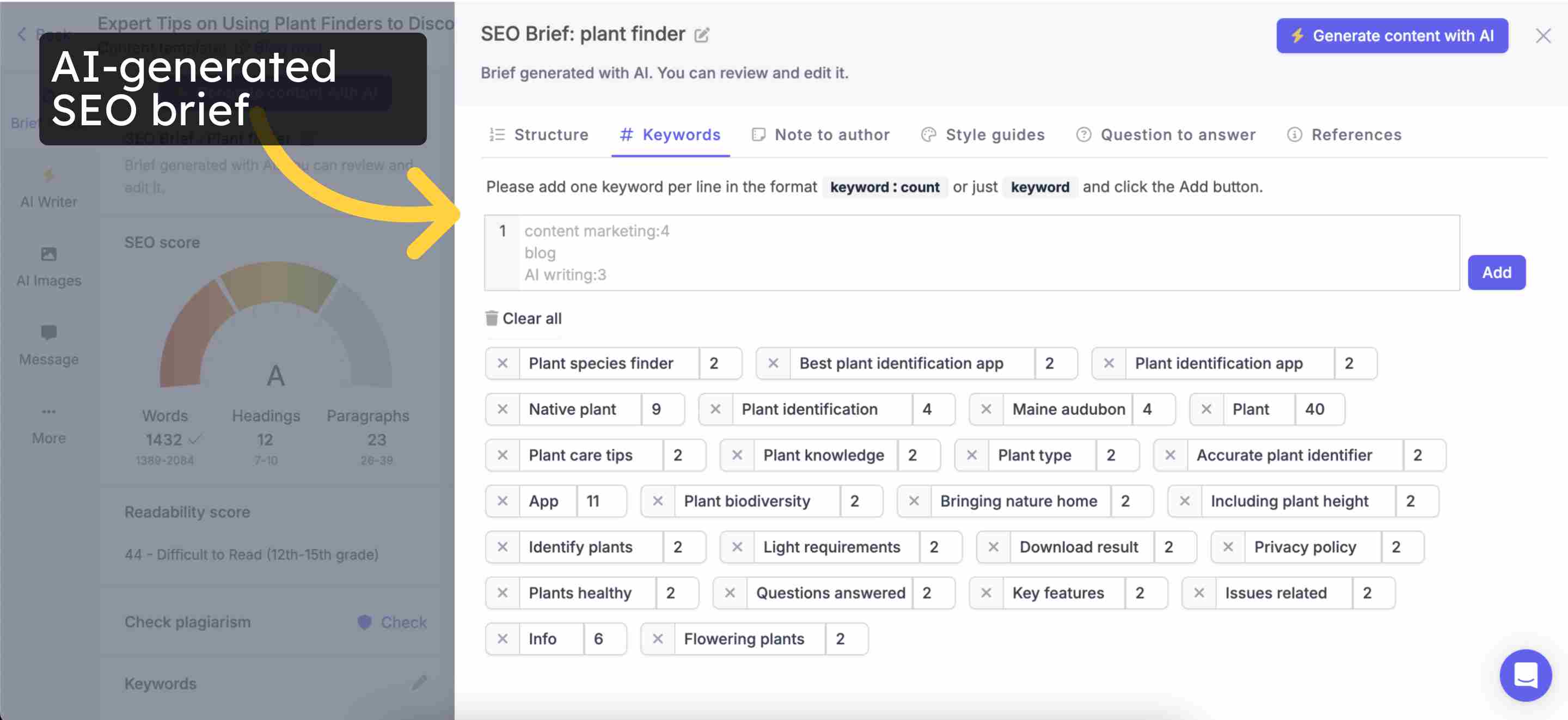
AI-generated SEO brief
Feel free to modify this SEO brief as per your needs. You have the option to add or remove keywords, adjust the word count, and update the reference and questions sections. You can also add more notes and style guides for your writers. If you want to do faster keyword research with an AI keyword generator to enrich the brief, Narrato’s AI keyword generator can give you some excellent suggestions. Simply type in your primary keyword and click ‘Generate’.
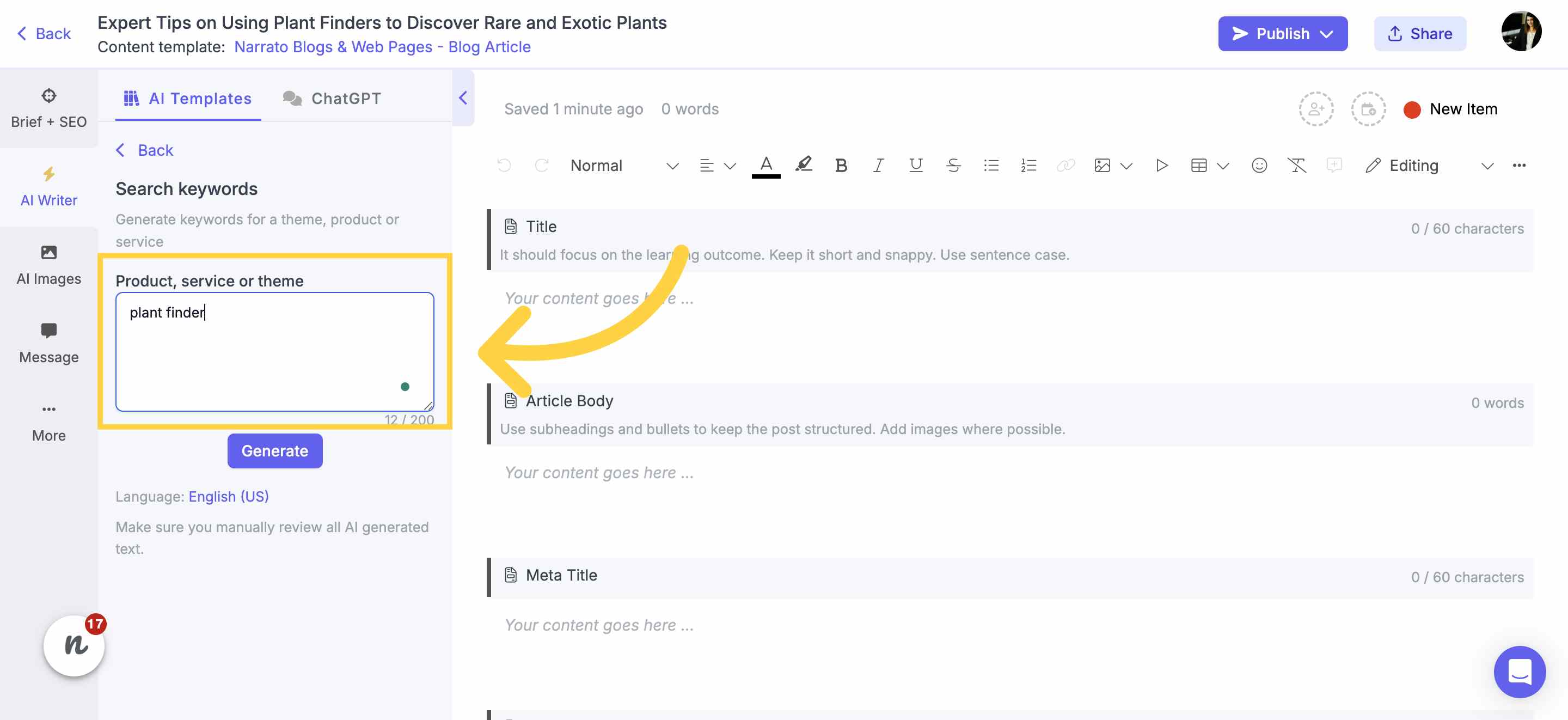
Using the AI keyword generator
The AI will give you a list of relevant keywords, along with the average search volume for each keyword.
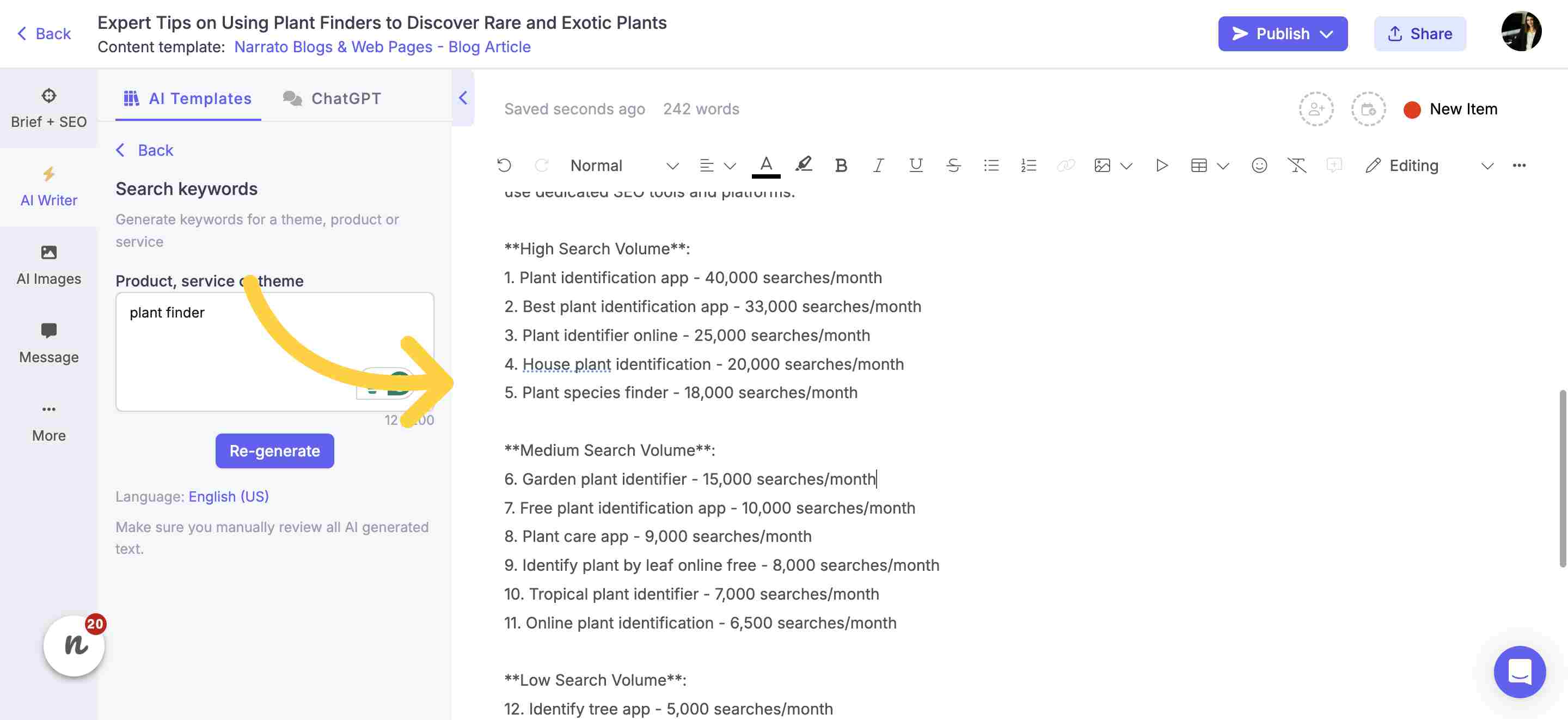
AI-generated keyword list
You can then add this list of keywords to the SEO brief, along with the count for each.
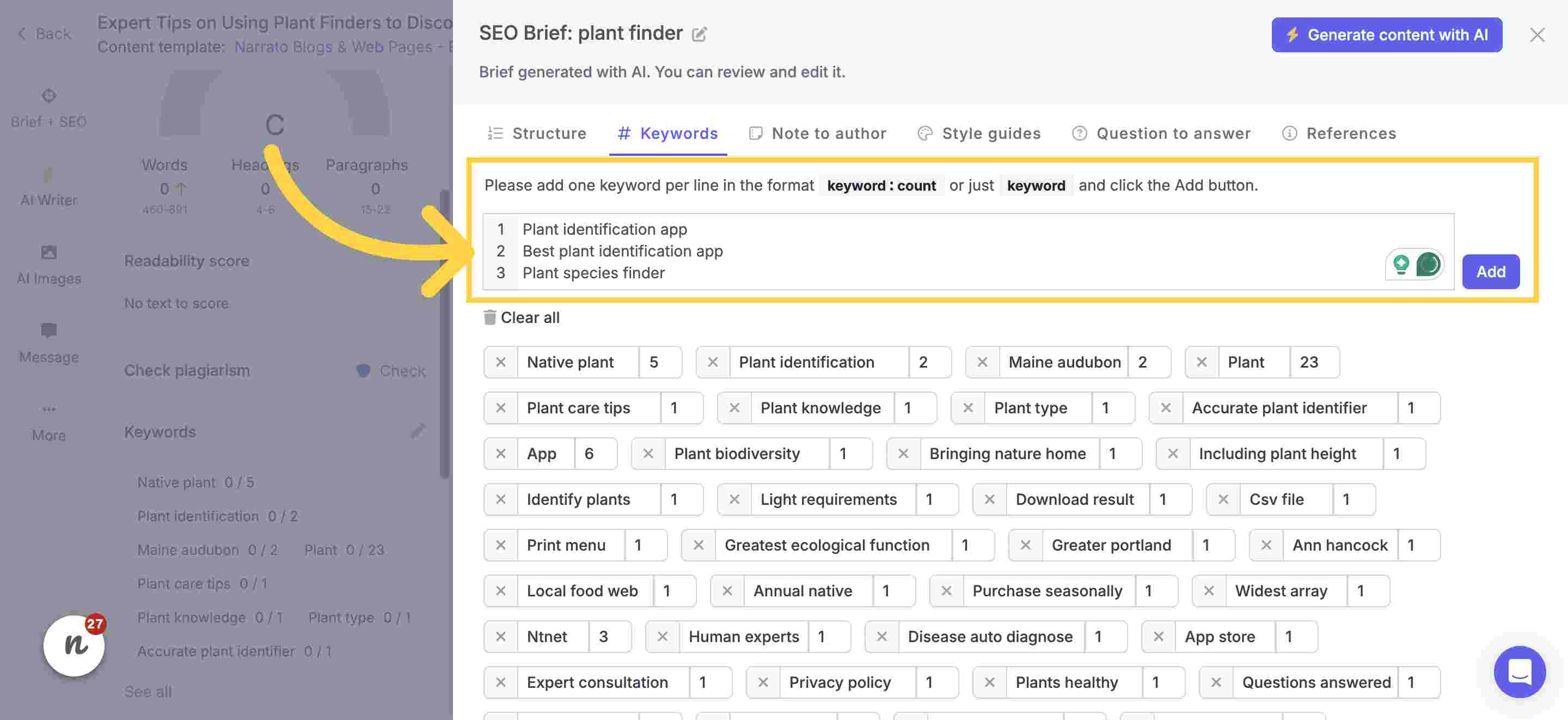
Adding keywords to the SEO brief

Step 3. Create a long blog article from the SEO brief
With a detailed SEO brief in place, it’s time to start writing. An AI writer can take the heavy lifting off this process too. By feeding the AI long blog article generator the essentials from SEO brief, it can generate a comprehensive draft of your article. You’ll find an option to “Generate content with AI” on the SEO brief itself.
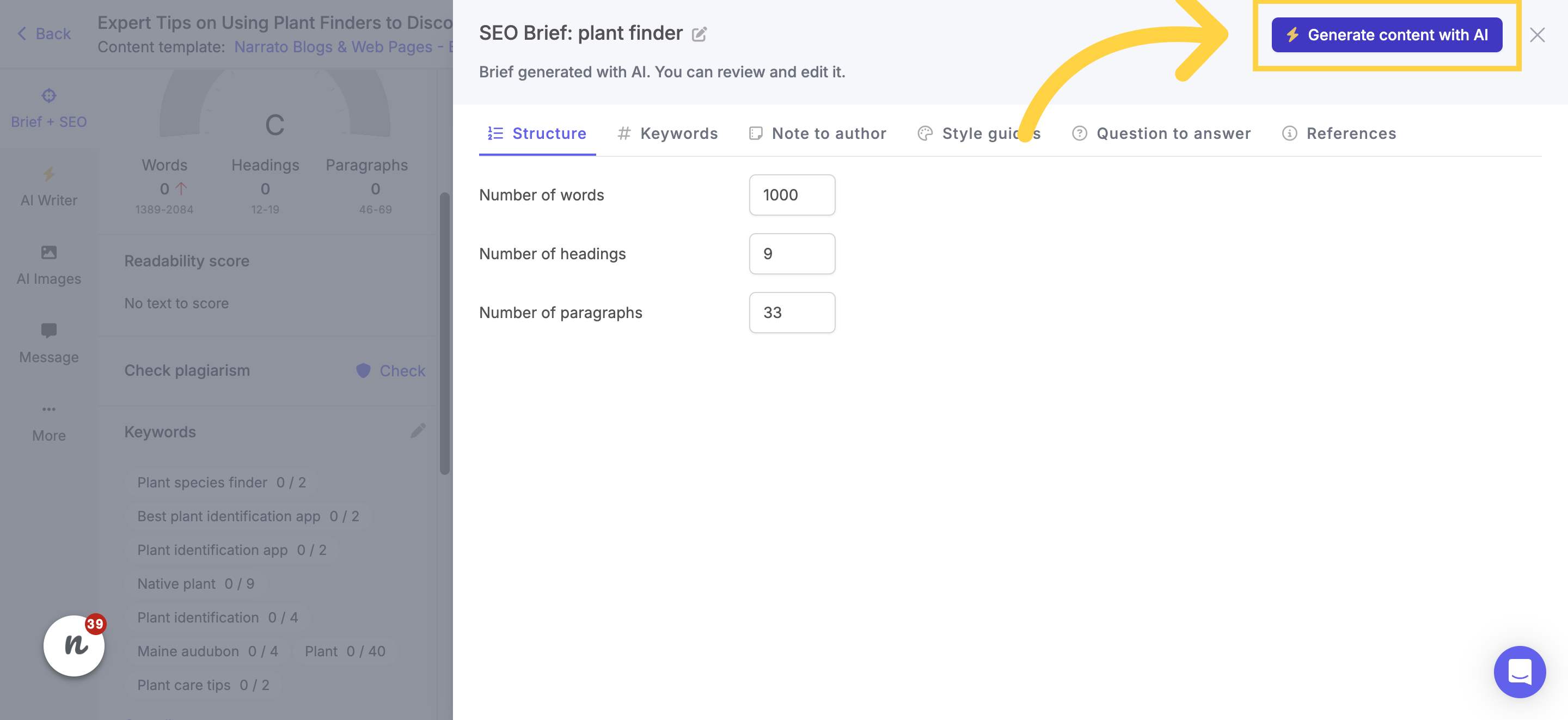
Generate content with AI
The same option is available on the main content task page too. Once you click on the option, you can select how you want to generate the blog article. You can either generate it using URLs or documents or from the topic.
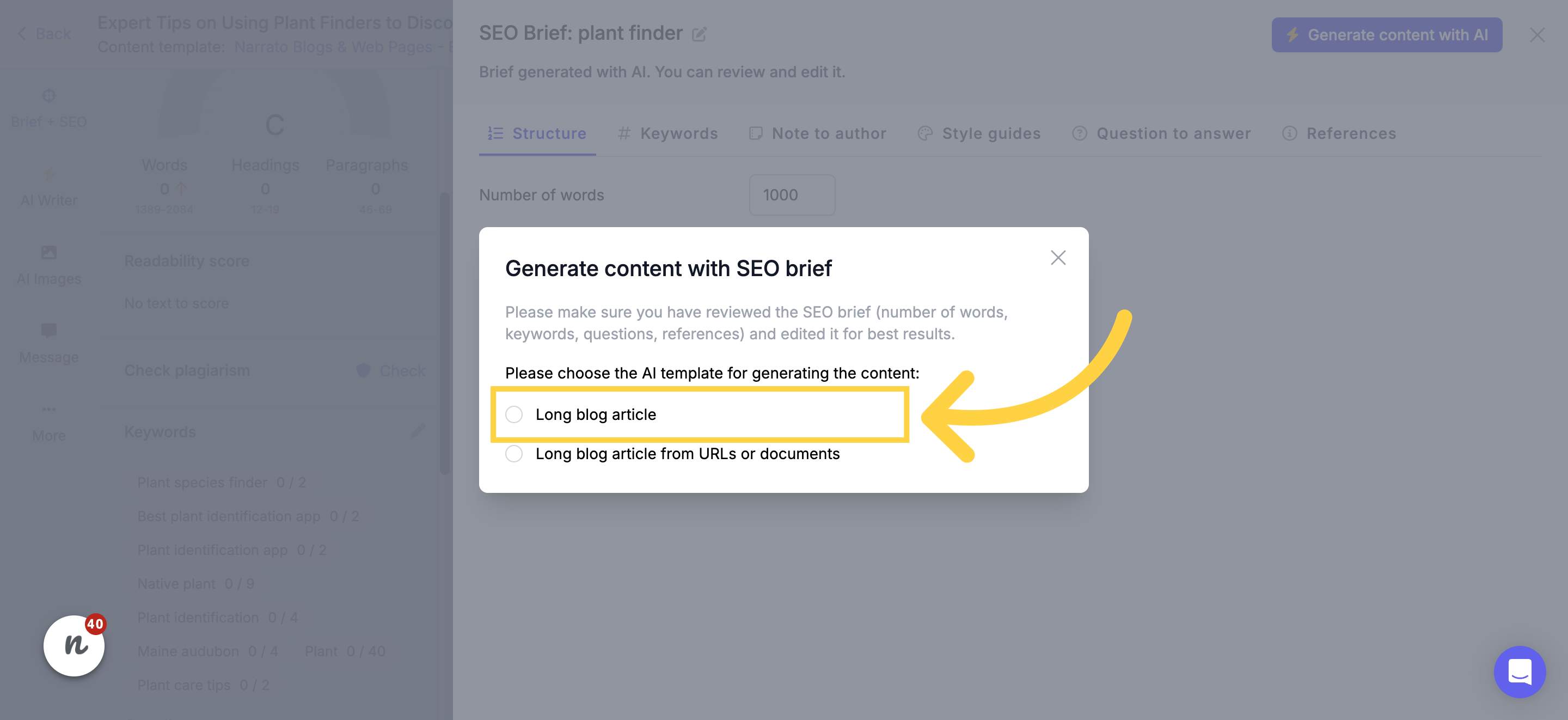
AI long blog article generator
Next, the tool will ask whether you want to include suggested questions from the SEO brief. If you found them to be relevant to your article, click yes, and then “continue”.
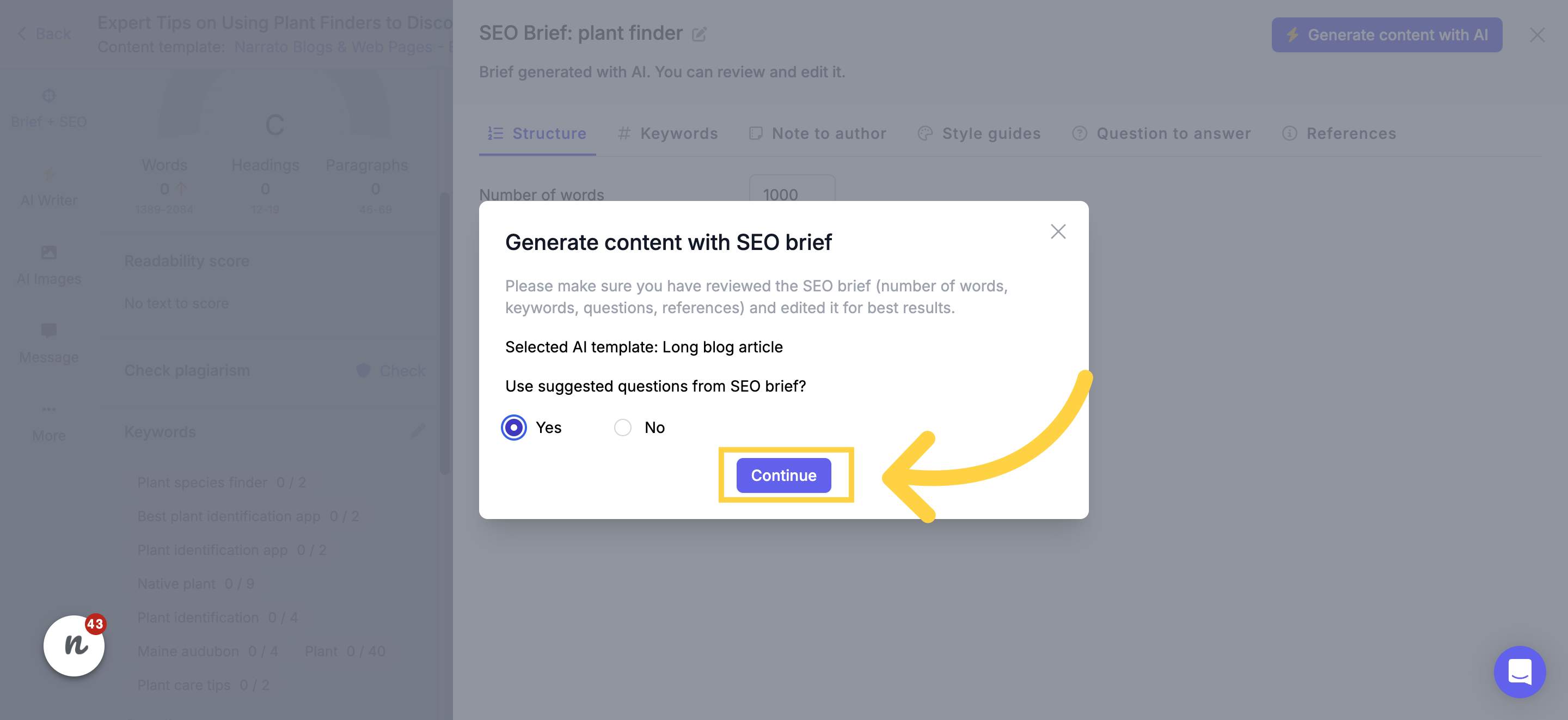
Include suggested questions from the SEO brief
The AI will create a blog brief, with keywords, article length, tone, and a comprehensive AI-generated blog outline with H2 and H3 headings. You can edit this brief to suit your requirements, and you can also specify the links to be added to specific keywords.
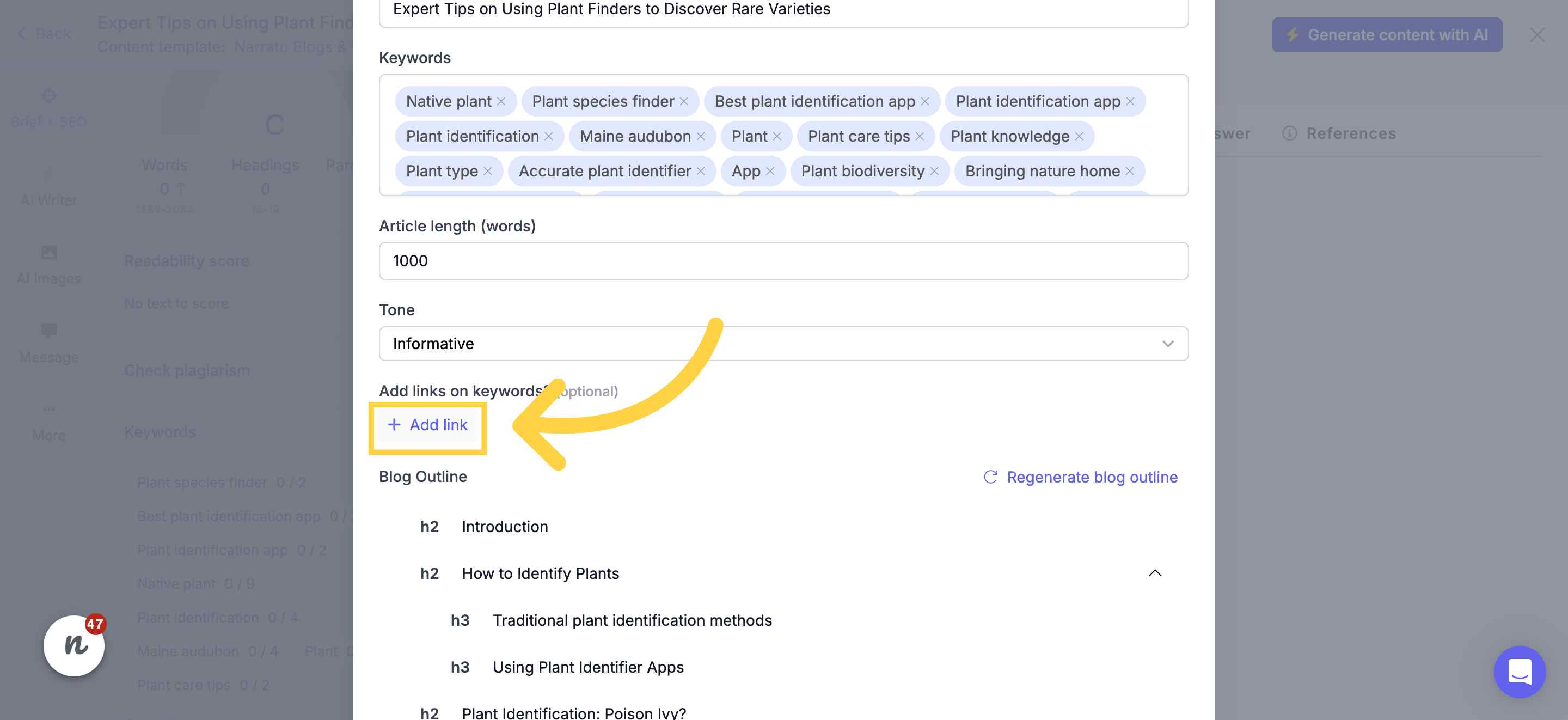
Editing the SEO brief
After you’re done making the adjustments, click on “Generate article”.
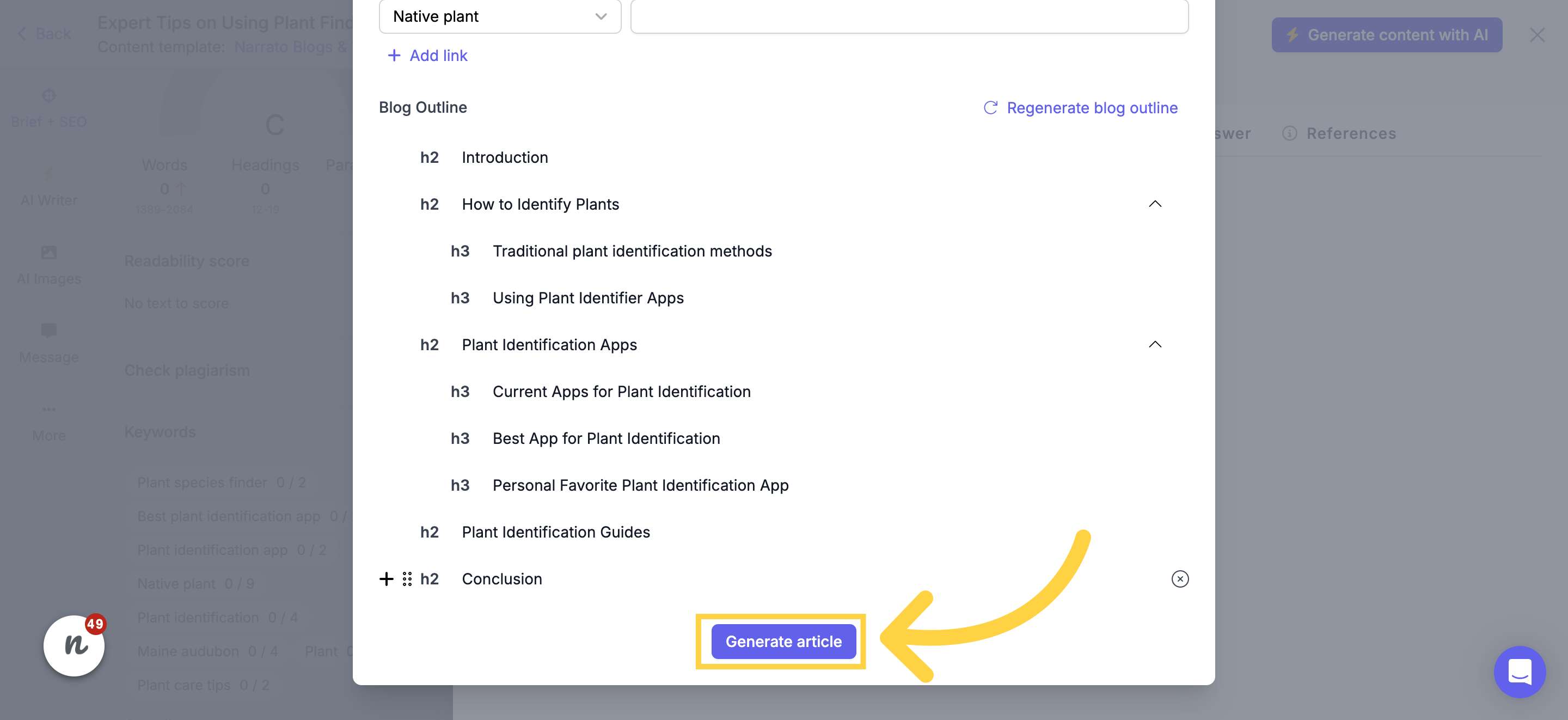
Generate article using AI long blog article generator
The AI blog writer will generate your SEO blog in a few seconds, tailored to match all the details you’ve provided in your brief. This handy tool will methodically incorporate your specified keywords throughout the article to ensure it’s well-optimized for search engine visibility. Plus, you can also specify links to add to specific keywords that will be added to the final article automatically.
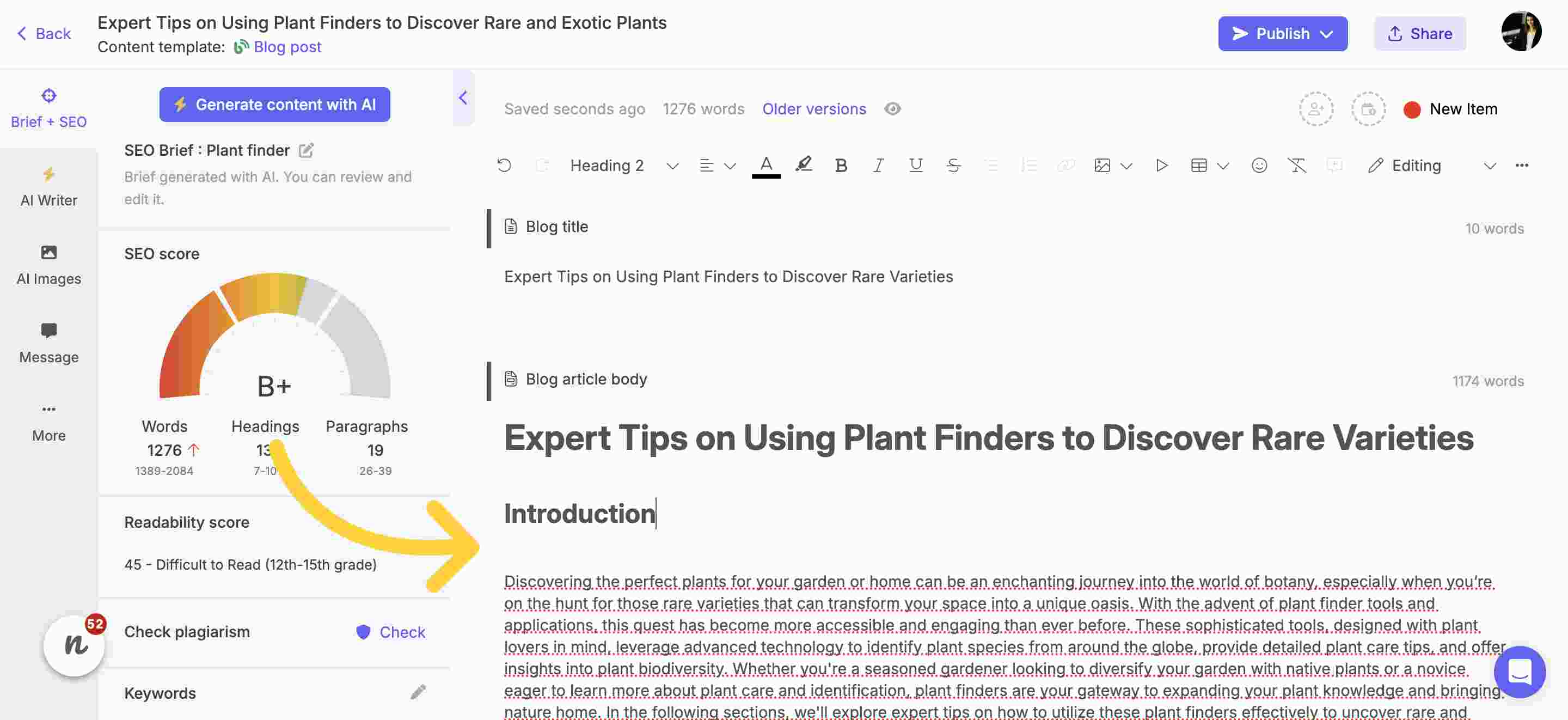
AI-generated SEO content
It will also add relevant images and videos, along with a feature image, meta description, and title, and a social post for promoting the article on social post-publishing.
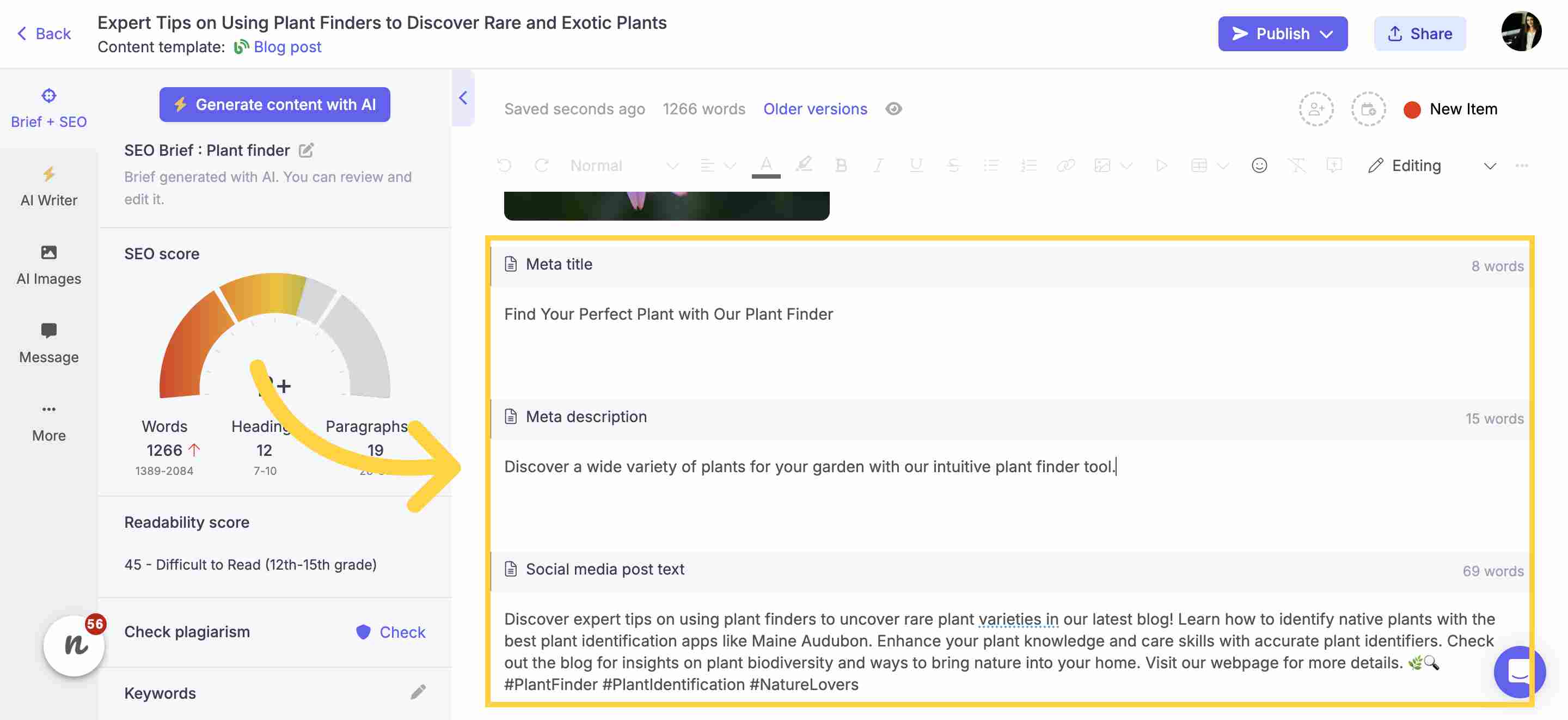
AI-generated meta description & title and social post
Now, your role is to refine this draft and ensure the content flows well and meets your audience’s expectations.
If you choose to generate a long blog article from URLs or documents, you will have the option to pick reference URLs from the SEO brief or provide your own. This makes the process even simpler and faster.
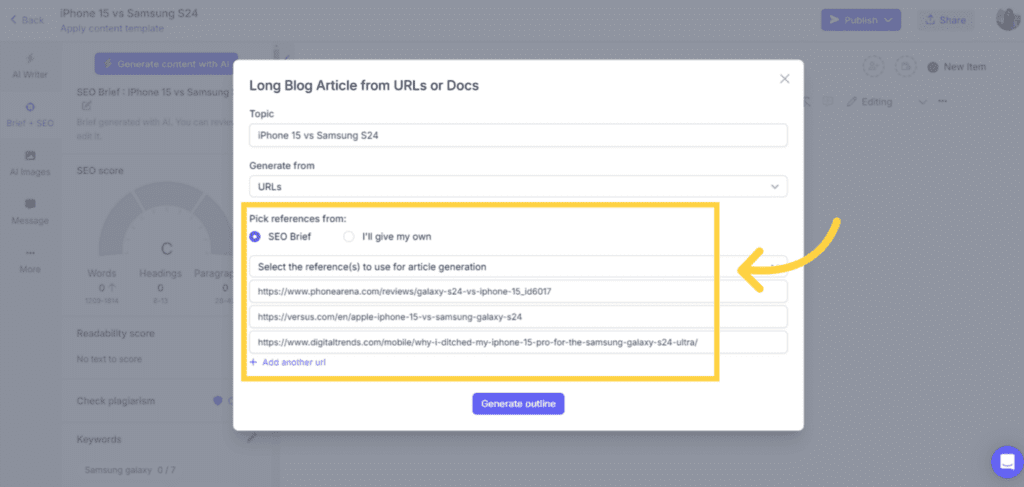
Step 4. Enhance your content using AI
Beyond generating the initial draft, AI tools can help refine your content too. They can offer suggestions for making sentences clearer or more engaging, which can significantly enhance readability and user experience. These factors affect SEO too.
Narrato’s in-line AI writing assistant simplifies the process of improving and optimizing content on the fly. Use cases on this tool include improving, shortening, simplifying, rewriting, summarizing, and expanding text. For any custom changes you want, there is an “Ask AI” option too.
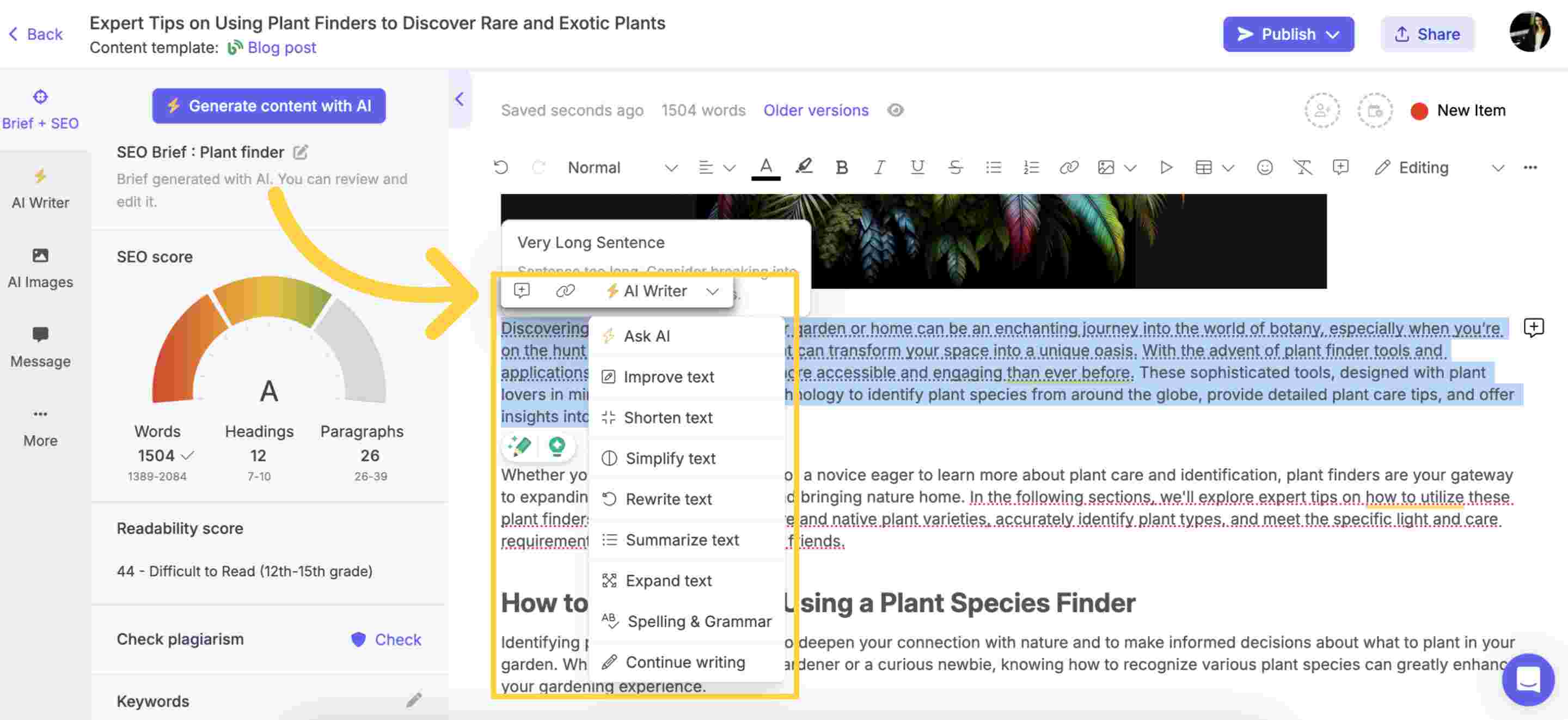
In-line AI writer
You can also edit and enhance content with AI Chat tool on Narrato, using some good ChatGPT prompts for SEO content creation.
You can add unique images to your article using the AI image generator. It can turn your text prompts into unique images that would be perfect for your blog article. Or choose royalty-free stock images from the CC images library.
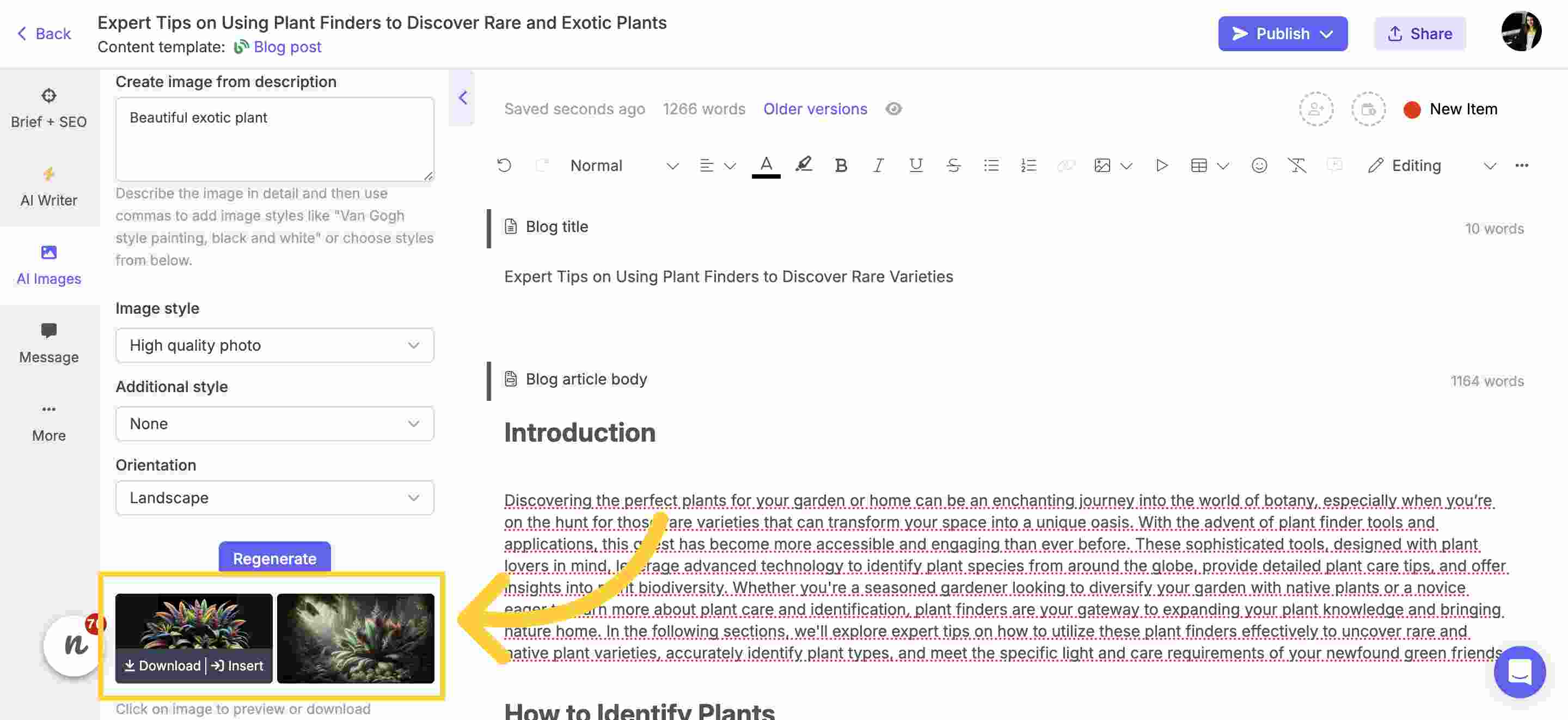
AI image generator
Just click on “insert”, and the chosen image will be added to your article.
Step 5. Generate SEO meta title and description
An often overlooked but crucial part of blog SEO is the meta title and description. These are what appear in search results if your content is served up by serach engines, essentially acting as your content’s first impression. Search engines also assess your content’s usefulness or relevance to a search term/query by the SEO meta data, making it extremely important to optimize these for the right keywords.
Generating SEO meta descriptions using AI will give you search optimized meta titles and descriptions that not only contain your target keywords but also generate intrigue and encourage clicks. This can significantly impact your content’s click-through rate, driving more traffic to your site.
Narrato offers an AI SEO meta description and title generator that can generate SEO-friendly meta data for your article. Simply input your article topic and keywords, select your desired tone, and hit the ‘generate’ button.
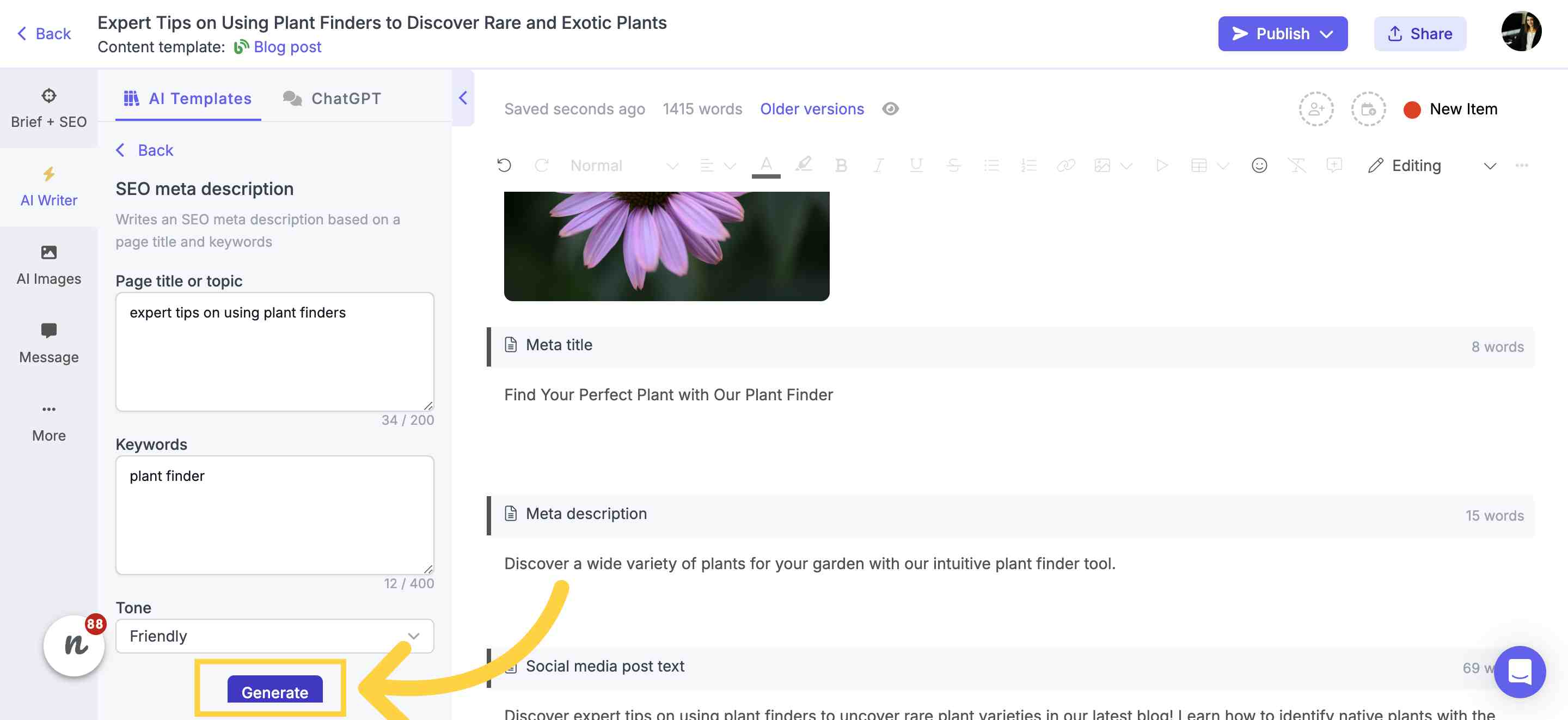
AI SEO meta description and title generator
You’ll get your AI-generated SEO meta title and description in a few seconds.
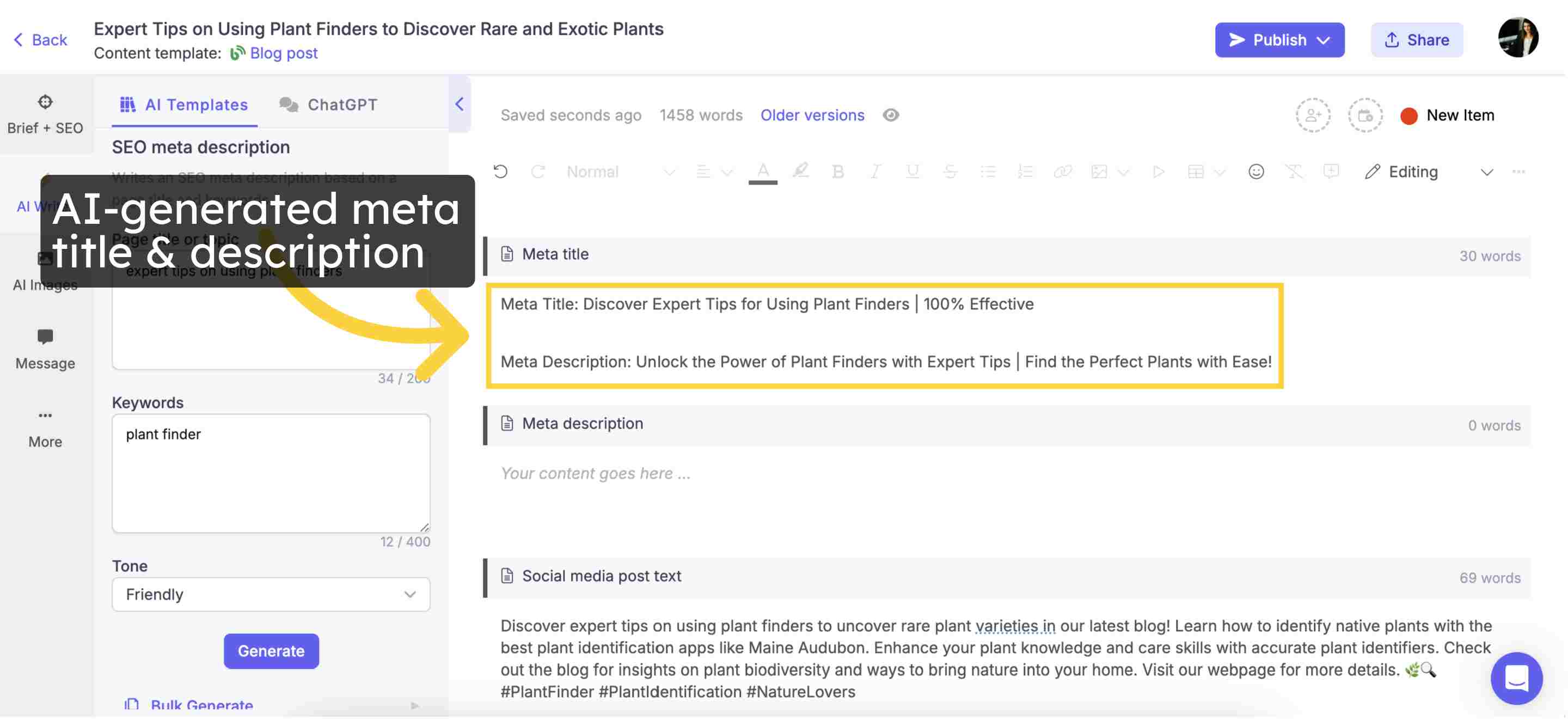
AI-generated SEO meta description and title
You can also generate SEO meta descriptions in bulk using AI for multiple blog posts or web pages, on Narrato. Here’s a detailed guide on using an AI SEO meta description and title generator.

Step 6. Run final grammar, plagiarism, and SEO checks
The final step in SEO content creation involves polishing your article to ensure it’s ready to shine. Grammar and plagiarism checks are essential to maintain credibility and originality. Platforms like Narrato have in-built tools for these checks, ensuring your content is error-free and unique.
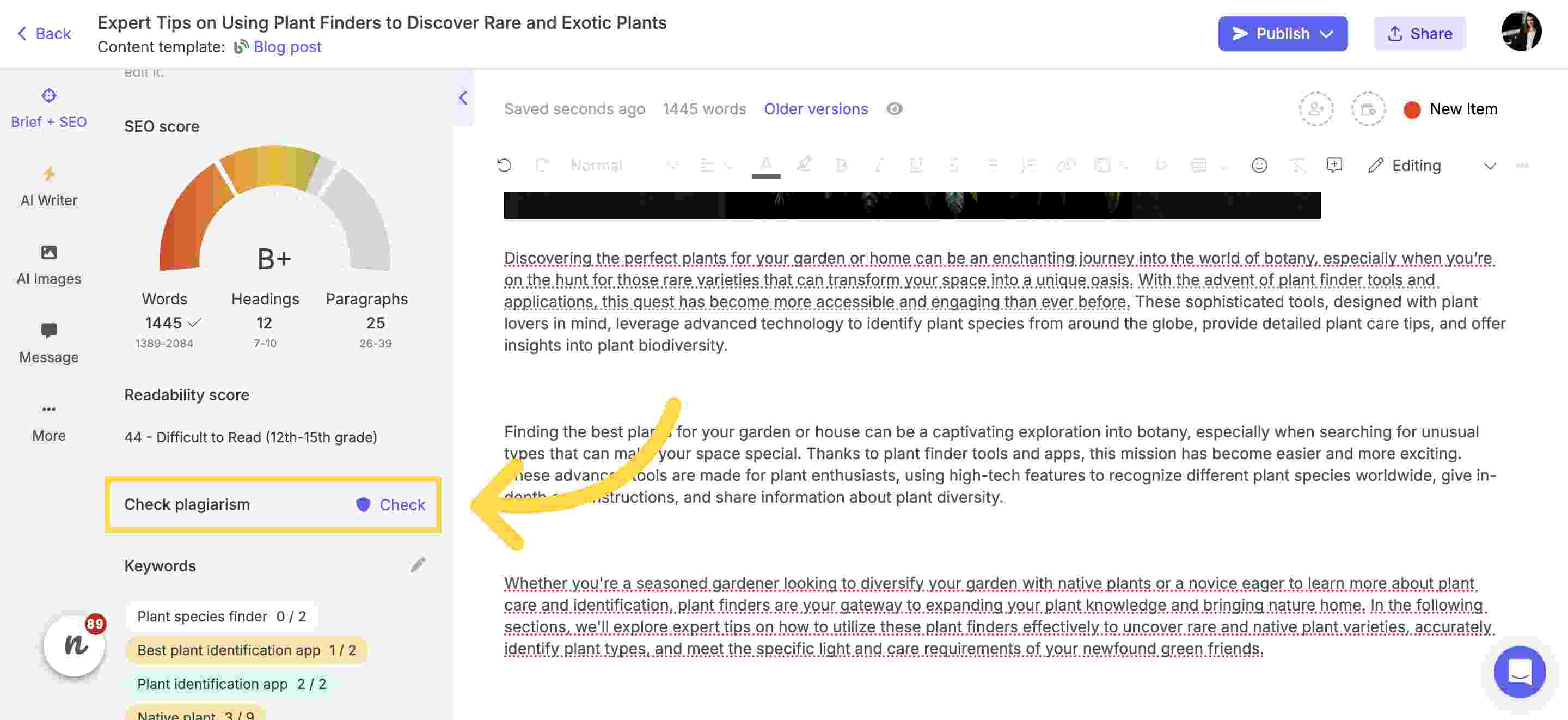
Plagiarism check on Narrato
Any sections of text that have readability or grammar issues are also highlighted to help improve your content’s ranking potential. To correct these issues, you can highlight the text, open the in-line AI writer, and select the ‘Spelling & Grammar” tool.
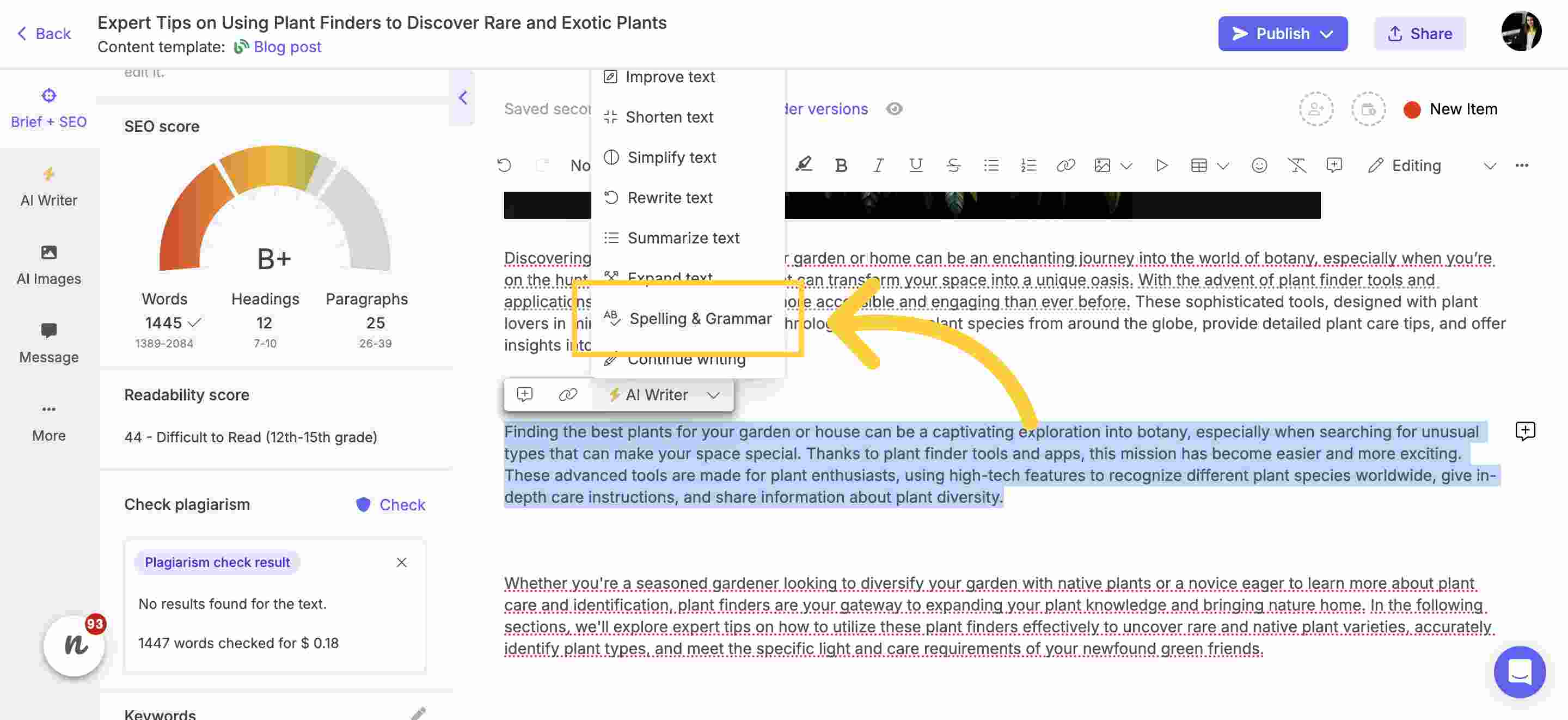
Grammar correction tool on Narrato
This will rework that specific section to eliminate any grammatical errors and readability issues.
Lastly, look for any areas for improvement or optimization you might have missed, such as keyword density, image alt texts, and more. This last sweep ensures your content is not only high quality but fully optimized for search engines.
Best practices for SEO writing with AI
SEO writing with AI makes it easier and faster to produce content that climbs search engine rankings. But, like any powerful tool, its effectiveness depends on how you use it. Here are some tips to keep in mind –
1. Do thorough keyword research
The foundation of effective SEO writing, AI-powered or not, is thorough keyword research. It’s about finding the right balance between popular and niche keywords that can drive traffic to your website. AI keyword research tools can sift through massive datasets, identifying trends and opportunities that may be invisible to the human eye. It can anticipate shifts in search behavior, suggest long-tail keywords, and even predict the competitiveness of certain phrases. This doesn’t mean you can set it and forget it, though. Combine AI insights with your understanding of your target audience’s needs and preferences to select keywords that truly resonate.
2. Make sure your content has substance
While keywords get people to your page, it’s the substance that keeps them there. This is important to note whether you’re creating fresh SEO content or want to SEO existing content using AI. AI can help tailor content to your audience’s preferences, but the soul of your message must be genuinely informative or entertaining. It’s crucial to infuse your content with insights, anecdotes, or data that reflect an understanding of your audience’s challenges and desires. A mix of AI efficiency with human empathy and creativity often hits the mark, resulting in engaging and valuable content.
3. Add alt tags to images
In the world of SEO, every element of your webpage holds potential value, including images. Don’t forget to add descriptive alt text for images, making your site more accessible and improving SEO. Accurate alt tags help search engine crawlers understand and index images, contributing to the overall relevance and authority of your page. Remember, the key is relevance and clarity.
4. Avoid over-optimization
There’s a fine line between optimization and over-optimization. In the past, stuffing articles with keywords could improve rankings, but today’s search engines are far more sophisticated. They prioritize user experience, valuing content that feels natural and helpful over keyword-saturated pages. AI can help identify ideal keyword densities and suggest synonyms to vary language without reducing relevance. However, keep a close eye on the suggestions and ensure your content remains readable and captivating to your human audience. Over-optimization can lead not only to penalties from search engines but also to a loss of trust from your readers.
5. Do fact-checking and cite any sources
In an era where information is abundant, it’s on you to ensure the information is accurate and to attribute it correctly. Fact-checking remains a distinctly human responsibility. Ensure all claims are verified and any referenced material is properly cited. Not only does this build trust with your readership, but it also strengthens your content’s authority, which is a key ranking factor for SEO.
Embrace SEO Writing with AI
SEO writing with AI has the power to streamline the content creation process, allowing for more efficient optimization and potentially higher rankings on search engines. By incorporating smart content writing tools for SEO into your SEO content writing strategy, you can stay ahead in the competitive digital space, and ensure your content reaches and resonates with your intended audience.
Whether you’re an established SEO agency using AI to boost productivity, a seasoned content creator, or a budding business, the future of SEO is bright with AI by your side. Now, go out there and start crafting content that’s as smart as it is searchable!


